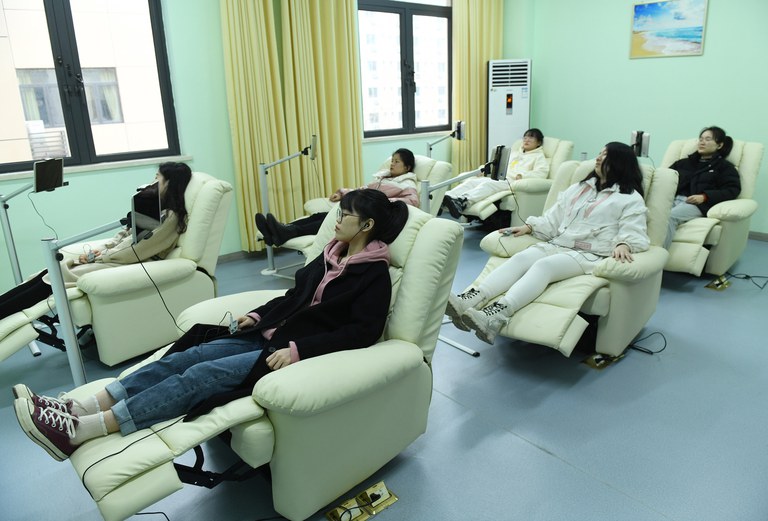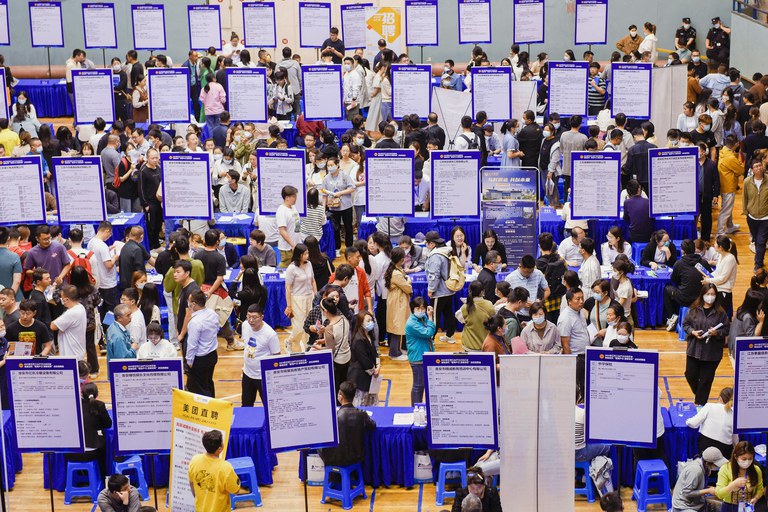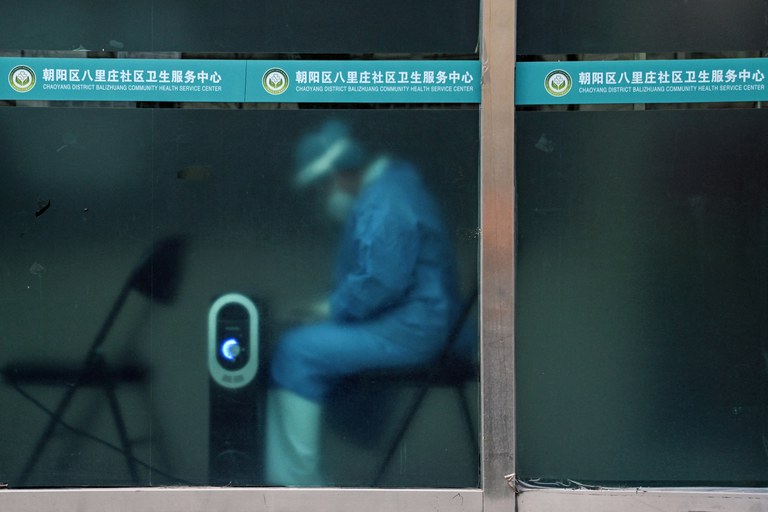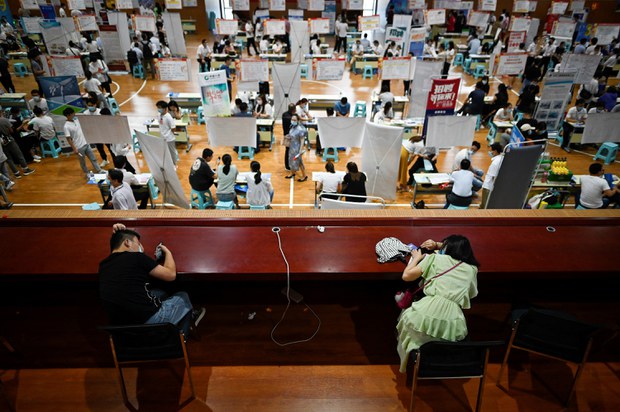The death of Hong Kong singer and Disney “Mulan” voice actress Coco Lee on July 5 has left many mourning an international star who struggled with depression to the extent of wanting to take her own life at a relatively young age.
It has also focused attention once more on mental health in China, public awareness of which has burgeoned since the turn of the century, albeit amid an ongoing struggle to meet the demand for psychological and psychiatric services.
Many in the country are at risk of depression – especially young adults, according to a recent survey.
Yet China currently has just under two psychiatrists per 100,000 head of population, compared with a developed world average of just over nine, according to the World Health Organization, while a 2021 study by Beijing-based researchers published in The Lancet found that just 9.5% of patients with depression in China receive medical treatment.
Faced with a weakening economy after three years of stringent pandemic restrictions, skyrocketing unemployment, and life under a high-tech authoritarian regime, China’s 18-24 year-olds were found to have a 24.1% risk of depression in a government mental health survey completed last year, compared with an overall risk of 10.6% for adults generally.
Standardized testing carried out by government researchers for the 2021-2022 China National Mental Health Survey also showed a similar rise in reported symptoms of anxiety in the same age group.

But as many who follow Lee’s tragic story are aware, depression and other mental health problems manifest differently in everyone.
For the young people who spoke to Radio Free Asia, political repression, economic woes, and workplace discrimination were cited as the main causes of mental health difficulties.
Wang Xia, a recent graduate and rights activist living in Beijing, struggles with a lack of economic security and conflict with her immediate family. Like other individuals quoted in this article, she requested anonymity to speak frankly about her difficulties, so RFA is using a pseudonym to identify her.
“I nearly jumped out of the building yesterday afternoon,” Wang said after getting into a fight with her mother on the phone. “I cried and screamed at her for a long time. Then I opened the balcony window. I wanted to jump, but my boyfriend quickly grabbed me from behind and held onto me.”
Wang said she has been arguing on and off for the past few days with her mother, who she says has no way of understanding her rights activism. Her experiences sound similar to what other young activists have termed “political depression.”
Political repercussions
Despite an ongoing and ever-widening crackdown on dissidents and rights lawyers under ruling Chinese Communist Party leader Xi Jinping, Wang has continued to provide assistance to dissidents and young activists, including campaigning for the release of those detained after the “white paper” protests of November 2022.
While Wang doesn’t feel as if she’s done anything significant, she is still traumatized by the fear of political repercussions.
“One time, I visited the family of a friend who was in trouble, and the state security people found me, and detained me for an hour or two,” she said.
“After that, I had trouble sleeping, and had a hard time focusing on work for about a week, and I kept drinking.”

But there are few people Wang can share her troubles with.
“Both of my parents are part of the system, and my mother is very controlling,” she said. “She likes to interfere in my personal life, and holds my personal values in disdain, which is disgusting and frightening.”
Wang can’t afford psychotherapy, and as noted by the WHO, there aren’t many doctors around with expertise in mental health. Her economic situation is insecure, so she relies on emotional support from her boyfriend and antidepressants to keep going.
A study published by China’s Centers for Disease Control and Prevention in June 2023 found that 21.08% of college students at a university in Shandong had experienced at least one traumatic event and that those who were unable to stop returning to a traumatic event in their minds were most at risk of suicide.
Wang Xia’s boyfriend Xiao Sun is also struggling, mostly from anxiety linked to harassment by state security police, he told RFA Mandarin.
Sun said he first ran afoul of the school authorities when he refused to install an anti-fraud app on his smartphone, arguing that it collected far too much personal information from users.
“I didn’t even do anything very extreme, such as call on others to resist it alongside me,” he said. “I just didn’t install it on my phone.”
“I kept a very low profile, but I was hauled in by my advisor, who was actually pretty nasty,” Sun said. “We were talking for more than an hour.”
‘Stability maintenance’ target
For a four-month period in 2022, Sun’s university was under COVID-19 lockdown.
Students were unhappy about the fact that there was no written record of the regulations, which were handed down by their lecturers verbally.
Sun applied to the school’s ruling Chinese Communist Party committee under disclosure of information laws, and spoke to a rights attorney via WeChat.
Sun said that conversation was intercepted by the state security police, making him a “stability maintenance” target.
“The state security police got directly in touch with the campus security and demanded that they investigate me,” Sun said. “I was interrogated continuously, and the school principal got personally involved.”
“He said there was a problem with the way my institute was educating students, and said they had to deal with me.”

Faced with huge political pressure, Sun withdrew his information disclosure request.
Later, according to Sun, his advisor arranged for one of Sun’s dorm mates – a Communist Party member – to keep an eye on him and report back on everything he did, plunging him into a state of constant anxiety.
“I am constantly aware that there is always someone watching me,” Sun said. “I have no privacy and I don’t ever feel safe.”
Added to that is the regular kind of pressure experienced by students and fresh graduates, especially in the current economic climate.
“On the first day of school, the dean gave a speech to the freshmen, in which he told us ‘you won’t find a job after graduating – not in this major’,” Sun said. “Your only option is to go on to pursue postgraduate studies.”
“This made everyone feel quite hopeless since the acceptance rate for postgraduate studies is so low,” he said.
And getting a job isn’t always the key to better mental health.
Sexual harassment and bullying
Liu Fang, who landed a sought-after government job after graduating from university, was diagnosed with depression four years later.
She blames a sycophantic and hierarchical workplace culture, sexual harassment, and bullying from her immediate boss.
“Their criticism of me would be that I worship foreign culture and that my thinking is more westernized,” Liu said. “I believe in universal values like freedom, equality, and civil rights.”
“I think everyone should be equal.”

Liu describes herself as a straight-talking person who doesn’t like to blindly follow orders at work, and who is unwilling to engage in the flattery of her superiors.
“[My supervisor] expects his subordinates to anticipate his wishes as if he were an emperor,” she said. “But I’m not the kind of person who will do that.”
“His way of retaliating is to constantly nitpick about my work, pointing out minor errors in punctuation or page numbering,” she said. “He’ll say stuff like — ‘are you here to work or just play around?'”
“He singles me out at our weekly meetings and criticizes me for half an hour to an hour, with emotionally manipulative verbal abuse,” she said.
And his behavior hasn’t stopped there, Liu said, adding that he has also sexually harassed her, with her refusal to play along with it annoying him still further.
Liu describes the psychological abuse she has faced in the workplace as “like a nightmare,” but she can’t afford to quit in the current economic climate.
Lockdowns exact toll
Outside of the office, the environment for women is scarcely any better.
The discovery of a woman chained by the neck in an outbuilding in the eastern province of Jiangsu rocked the country last year. Authorities later said she was a trafficking victim who had borne eight children with a man who had acquired her.
“No wonder so many people in China say that a marriage certificate is a way of selling yourself to someone,” Liu said. “Because once a man marries you, he can beat you, curse you, enslave you, and use you for your labor and reproductive abilities.”
“Everyone, including the law, supports this,” she said.
Women in Jiangsu’s Feng county, where the chained woman was found, have been repeatedly denied divorces despite being victims of human trafficking from other parts of China, according to media reports at the time.
Against such a background, Liu is unwilling to date, marry or have children, despite ongoing pressure from her parents.
She was diagnosed with depression by a medical doctor in March.
Others have pointed to the three years of grueling lockdowns, mass quarantine and digital surveillance under Communist Party leader Xi Jinping’s zero-COVID policy, which ended in December 2022 following nationwide protests in November.
While the government has refused to release detailed statistics, anecdotal evidence has pointed to a spate of suicides during the grueling lockdowns of the zero-COVID policy, which ended in December following nationwide protests by young people.
In an apparent attempt to address the issue, the authorities called on local governments last November to set up psychological assistance hotlines for people forced into compulsory quarantine.
“Psychological counseling and support should be provided to relieve negative emotions, to alleviate their distress caused by the epidemic and to prevent extreme events triggered by psychological stress by those subject to quarantine or health monitoring,” the state-backed Global Times quoted official guidelines as saying.
‘Collective trauma’
Many of the young people who spoke to RFA cited external factors as the reason for their depression or poor mental health. The ICD-10 diagnostic manual in use in the United States lists both “reactive” and “situational” depression among its diagnoses.
“Let me put it this way,” 30-something Shanghai resident Zhao Di said, detailing a litany of economic reasons for depression among her social circle. “Not a single person I know has told me they’re happy.”
“Everyone’s dreams have been shattered these last three years,” she said of the zero-COVID policy that laid waste China’s export-oriented, manufacturing economy.
“Everyone feels like they’ve hit rock bottom,” Zhao said, adding that many don’t even have the luxury of “lying flat,” a passive response reported by China’s younger generation in the face of massive pressure to tick off traditional goals like marriage, a mortgage and children in the face of huge economic obstacles.
“The lucky ones can lie flat, but the less lucky who are carrying millions of yuan in mortgage debt feel as if their lives aren’t worth living,” she said. “Every day is filled with fear and trepidation.”
Another factor affecting people’s mood is the shrinking space for free speech, amid ever-widening controls on public expression by the government after a decade under ruling Chinese Communist Party leader Xi Jinping.
According to a 2023 report by Freedom House, the government “continues to tighten control over all aspects of life and governance, including the state bureaucracy, the media, online speech, religious practice, universities, businesses, and civil society associations.”
China’s civil society, once a significant provider of mental health and support services to the marginalized, is described in the report as having been “largely decimated.”
Many of the people Zhao used to follow on social media have now had their accounts shut down by government censors, cutting off another source of connection and support.
“People feel suffocated when their main channels of communication are cut off,” Zhao said. “It’s like being gagged, and this feeling is fermenting inside them.”
“People of our generation living [in today’s China] are trapped in a general state of depression,” she said, adding that people are now being banned just for talking about unemployment or other economic woes.
“Such things are labeled ‘negative energy’ or ‘disharmonious voices’,” she said.
Ren Ruihong, who has worked with youth mental health rescue projects in China, said economic uncertainty is one of the biggest factors creating mental health problems among young people in China today.
“We know that there is significant economic pressure, while social security provision is woefully inadequate,” Ren said. “Everyone is in a constant state of worry.”
“Many people of this generation care about politics, especially in big cities,” Ren said. “They used to be able to go online and vent their frustrations by getting over the Great Firewall, but they daren’t do that anymore.”
She said many people have now reached the limit of their personal resilience.
Liu Fang agreed.
“Mental health issues have gotten to the point where it’s not just an individual problem anymore – it has become a collective trauma,” she said.







